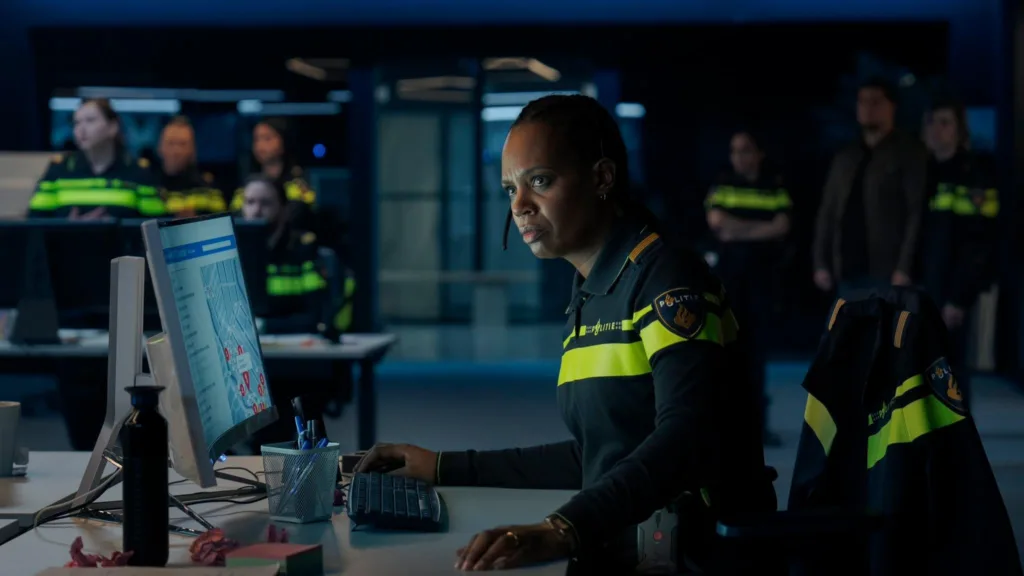The setting is a temple of global commerce, an Apple store in Amsterdam, its clean lines and glass walls suggesting a world of seamless connectivity. Into this space walks Ilian, a Bulgarian visitor on a simple mission to replace his lost AirPods. His mundane errand becomes the inciting incident for iHostage, a film that grounds its terror in the terrifyingly plausible.
A gunman named Ammar enters, fires shots that shatter the minimalist calm, and yanks Ilian into the center of an international crisis. With the Bulgarian as his human shield, Ammar issues his demands: a fortune in cryptocurrency and safe passage.
Outside, police forces scramble to contain the situation. Inside, other customers and employees are scattered, some hiding upstairs, others crammed into a supply closet, all nodes in a network of fear. The film immediately establishes a scenario rooted not in fantasy, but in the specific anxieties of our highly technological and public world.
Realism at the Expense of Feeling
Director Bobby Boermans commits to a visual strategy of procedural authenticity. The film’s language is one of surveillance and fractured viewpoints, shifting between the cold omniscience of CCTV, the frantic perspective of police body cams, and the claustrophobic confines of the hostages’ hiding spots.
This approach aims to reconstruct the 2022 event with the dispassionate accuracy of a documentary. This dedication to factual recreation, a choice that feels distinctly European in its formal restraint, has a significant effect on the drama. For long stretches, the film operates as a clinical report, a minute-by-minute log of a standoff that paradoxically fails to generate sustained dread.
The camera’s detached observation creates distance, and the decision to portray the gunman Ammar as often static or listless robs the situation of its menace. The film meticulously documents a terrifying event, yet it struggles to translate that terror into a palpable experience for the audience.
Avatars of a Crisis
The film’s focus on procedural detail leaves little room for its characters to become more than figures in a diorama. Both the captive and the captor are presented as startlingly blank. Ilian remains a stoic victim, his reactions so muted that he becomes a mere placeholder for the audience, a passive object to whom the action happens.
This approach denies the viewer a strong emotional anchor. Likewise, the antagonist Ammar is a cipher. His motives are reduced to the unexamined declaration that “the system has wronged him,” a line repeated without exploration or depth.
This contrasts sharply with American genre counterparts like Dog Day Afternoon, where the hostage-taker’s psychology is the engine of the story. Here, the supporting cast, from the negotiator Lynn to the employee Mingus, are presented as professional functions rather than people.
The performers are competent, but the script gives them no inner life to portray. This hollowness feels like a conscious choice, sacrificing character psychology for a broader, impersonal portrait of institutional response.
The Politics of Perspective
The film’s ideological framework becomes clear in its depiction of power. With a script co-written by an Amsterdam detective, the police are shown as unerringly competent and heroic. Their operations are a model of efficiency and control, without a single misstep.
This sanitized portrayal of state authority is set against the shallow depiction of Ammar, a man of Muslim background whose act of violence is detached from any meaningful personal or social context. This narrative choice aligns with a familiar pattern in some European media concerning immigrant populations. The climax is the film’s most viscerally effective sequence, a jolt of sudden action as Ilian makes a run for freedom.
The filmmaking here is potent, but its perspective is absolute. Through tight camera angles from inside the police vehicle, the controversial real-life killing of the assailant is reframed as a decisive, unambiguous act of heroism. The film’s most thrilling moments are also its most politically tidy, delivering a resolution that provides a rush while reinforcing a simple, state-sanctioned truth.
iHostage is a 2025 Dutch crime thriller directed by Bobby Boermans and written by Simon de Waal. The film was released on Netflix on April 18, 2025, and is available for streaming worldwide.
Full Credits
Director: Bobby Boermans
Writer: Simon de Waal
Producers: Sabine Brian, Boudewijn Rosenmuller, Diederik Van Rooijen
Cast: Soufiane Moussouli, Admir Šehović, Loes Haverkort, Marcel Hensema, Emmanuel Ohene Boafo, Matteo van der Grijn, Fockeline Ouwerkerk, Roosmarijn van der Hoek, Robin Boissevain, Louis Talpe, Eric Corton, Ahlaam Teghadouini, Thijs Boermans, Jolanda van den Berg
Director of Photography (Cinematographer): Florian Legters
Composer: Federico Lecuona Damborsky
The Review
iHostage
iHostage is a technically proficient and clinically precise recreation of a terrifying real-world event. Its commitment to realism, however, comes at the cost of dramatic tension and emotional investment. The film presents a fascinating crisis through a detached lens, resulting in a narrative with hollow characters and a troublingly one-sided perspective that valorizes authority. While its finale delivers a jolt of intensity, the journey there is a cold, remote exercise that documents terror without ever truly making you feel it.
PROS
- A meticulously authentic recreation of the real-life incident.
- The final action sequence is intense and well-executed.
- Effectively uses multiple perspectives to create a procedural feel.
CONS
- Fails to build sustained suspense or emotional stakes.
- Characters are one-dimensional and lack psychological depth.
- Presents a simplistic and politically one-sided narrative.
- Its documentary-style realism often undermines dramatic engagement.

















































